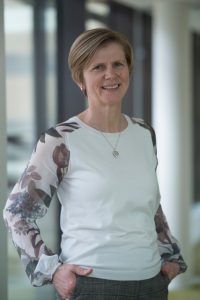April 18, 2019, by Simon Langley-Evans
Spotlight on Professor Debbie Sparkes

- What was your career pathway leading to your current role?
After completing my PhD here at Sutton Bonington with Prof Keith Scott, I was appointed as Lecturer in Agronomy in 1995 on a 4 year contract. This was funded by Keith’s external work with ADAS (an independent provider of agricultural and environmental research and consultancy)and was largely to support him in both his research and teaching.
Skipping the usual post-doc phase did mean that I missed out on that period of dedicated research but this was a great opportunity to work alongside Keith on a number of industry related projects and to benefit from his extensive experience and networks. I then had a second 4 year contract, before moving to a permanent position.
In the early days I had a heavy teaching load, convening up to seven modules at one time, and I also took on the role of Course Director for the MSc in Crop Improvement.
In 2007, I was promoted to Associate Professor and in 2010, I led a bid for an Advanced Training Partnership from BBSRC and we were successful in being awarded a £4million grant to train professionals working in the agrifood sector. Setting up and running the training programme was extremely hard work but it brought me into contact with a number of influential people across the industry. In 2012, I was asked to review future research requirements for the sugar beet industry. This was the beginning of a very fruitful relationship with the British Beet Research Organisation (BBRO) and the wider sugar industry including two major research grants, two KTPs and five PhD studentships to date. It has also led, indirectly, to work with other industry partners such as Bayer Crop Science, BASF, Hutchinsons and the Processors and Growers Research Organisation (levy body for peas and beans). I was promoted to full Professor in 2017.
2. What challenges did you encounter along the way?
Going straight from PhD to lectureship did mean that publications were a bit slow at first.
For reasons that I still don’t understand, when it came to making my position permanent, the post had to be advertised and I had to apply for my own job. I found this incredibly difficult and even considered resigning over the issue. I’m glad it didn’t come to that but it was very unsettling at the time.
Keith died suddenly in 2000 which completely pulled the rug out from underneath my feet.
We were still working closely together on a number of research projects and PhD supervision, and he was a great mentor to me, so his death left a big hole. At the same time, funding for applied crop science in the UK almost completely dried up. Agriculture had become a dirty word and no one wanted to fund research in production agriculture.
3. How did you overcome those challenges?
Before Keith died I had won a couple of small research grants, but nothing major. I took on some of his existing grants to see them through to completion and started looking for more funding – but as I said earlier, production agriculture had become very unfashionable. Fortunately, that wasn’t the case in the rest of the world and hence my research continued mainly through international PhD students. Now that global food security is squarely on the agenda, improving crop yield and resilience is now much more ‘fashionable’ and many new funding streams have opened up. Close connections with industry have been really important to me and have helped me to access some of those funding streams (e.g. levy body funding, Innovate UK, KTPs).
4. Have there been any specific people or actions that you have found supportive in developing your career?
So, I’ve mentioned Keith more than once, he was a great mentor who shaped the early part of my career. When I have a difficult decision to make I still sometimes ask myself ‘What would Keith say?’ and I still get some good advice. I also still use some of his ‘words of wisdom’ when working with my own students and post-docs. For example, the advice he gave me when preparing for my PhD viva has been given to most of my own students over the past 25 years.
Colin MacEwan, who was Head of BBRO when I started to work with them, was also incredibly supportive. He showed great faith in me from the start and helped me to believe in myself.
When Neil Crout was Head of School he suggested that I undertake some Professional Coaching. He assured me that this wasn’t ‘remedial’ but I did wonder what it was all about. I needn’t have worried. The coaching experience was excellent: my coach asked just the right questions at the right time and really helped me to develop my career plans and to have the confidence to apply for promotion. I’ve had other opportunities for coaching since and have always grabbed them with both hands and found the sessions valuable.
5. If you could give advice to your younger self, what would you say about developing your career?
Looking back on my career in preparation for my inaugural lecture last year really helped me to reflect on how things had progressed. I never really had a plan – at least not until coaching made me think about things differently. I think I was lucky to find myself in a career that I loved without planning this at any stage (I didn’t even plan to go to university). So, I would encourage my younger self to take time to think about how I would like my career to develop. Not to over-plan but just to give it some thought and to discuss ideas with others. Coaches, mentors, colleagues, family and friends can all be great sources of advice.
No comments yet, fill out a comment to be the first

Leave a Reply